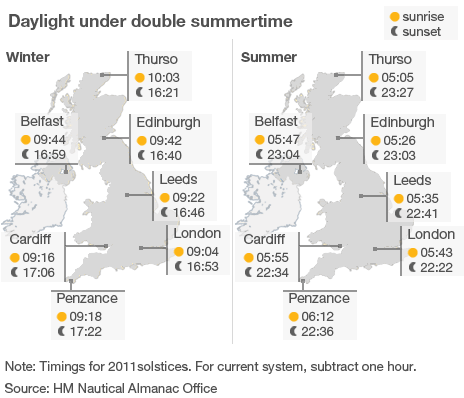A forthcoming proposal to change the time zone raises an interesting question about how our parliamentary democracy represents the diverse interests of this country.
Putting the clocks forward by one hour will be suggested as part of a government tourism strategy to create more jobs and encourage more visitors. Moving to Double Summer Time would bring the UK into the same time zone as most of the rest of Europe, from Poland to Spain. (Critics of the idea sometimes refer to “Berlin time”, letting us know that their own mental clocks have been put back by 70 years.)
The benefits of this change are said to include greater ease of business with European and Asian countries, as our time would be closer to theirs, and also greater safety and reduced energy costs in the winter because the hours of daylight would be used more efficiently. On the minus side, there is making business with America slightly harder (the flipside of the Euro-Asian argument) and the particular inconvenience that the switch might pose in northern Scotland, where the sun would not rise until 10 am in the winter months.
It is this last point that makes the time change proposal interesting from a democratic point of view.
Democracy as it is conventionally understood rests on the idea that every citizen has an equal say in decision-making, either directly or, more commonly, through the equal right to elect members of a legislative assembly. In giving everyone a vote of equal weight, it assumes that everyone cares the same amount. But is that assumption true?
In the case of foxhunting, it is suggested that, of the majority of the people who are opposed to, most of them do not in fact care very much about it, while for the minority who are in favour, it matters very much indeed. One person one vote systems which aim to reflect the balance of public opinion fail to capture this important fact.
The proposed change in the time zone raises a similar issue. The image below shows the sunrise and sunset times for different parts of the UK at the height of summer (on the right) and on the depths of winter (on the left).

We can see that at Thurso, in the far north of Scotland, the shortest day is only 6 hours 18 minutes, which means that the hour we might change represents 16 per cent of the available daylight. In Penzance in Cornwall, on the other hand, the shortest day is 8 hours 4 minutes, of which an hour is only 12 per cent. It would be stretching the maths too far to claim that to change the use of an hour of daylight matters 33 per cent more in Thurso than it does in Penzance, but one can see that it is nevertheless more significant in the north.
(As with other conservation issues, the cases that matter are where the resource in question is in short supply. When there are daylight hours in abundance, it matters less how efficiently we use them.)
If it matters more to the Scots than to the English which time zone we are on, how can that be reflected in the decision to be taken? There are 533 English MPs and only 59 Scottish ones, for example. The former could simply and crudely outvote the latter. Is that democracy in action?
The normal reaction of federalism is to think of decentralisation. If the English and the Scots have different interests, the issue should be devolved from the UK to national level and they can each decide for themselves. But, even though the English and Scottish interests might be different, there is an over-riding interest for both of them in solving this issue in the same way. For England and Scotland to adopt different time zones would be far more disruptive than either sticking with the current arrangements or moving to the new time zone together.
No, as long as there is a United Kingdom, this has to be a UK decision. But how to take it, when the losers lose more than the winners gain, that remains an awkward question.
¤ ¤ ¤
This criticism of electoral democracy, that it values all opinions equally, can be made even more acutely of the Alternative Vote electoral system. AV permits voters to list the candidates on the ballot paper in order of preference and transfers higher preference votes cast for unpopular candidates onward to more popular candidates in order to find the candidate with more than 50 per cent support. All the votes allocated to a candidate, whether first, second or lower preference, are given the same weight, even though it is likely that the voters care more about their first choices than their later ones. Giving them all the same weight is an over-simplification.
First Past The Post deals with this problem by assuming that the only candidate a voter cares about is the first preference: voters are deemed officially indifferent as between all the others. This is also an over-simplification, and arguably a worse one.
